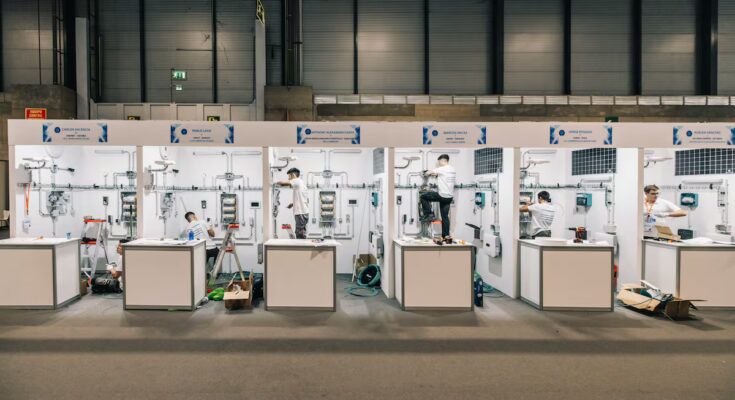Spain is facing a serious shortage of installers. Electrification and the demands of the modern world have triggered the demand for skilled professionals in solar and wind energy systems, smart devices (home automation) and energy efficiency devices in buildings, as well as charging points for electric cars. According to the INE, the country has only 373,000 workers in the electricity and electrotechnology sector. Its evolution is minimal: this volume of personnel is just 9.7% higher than that of 2011. This contrasts, for example, with the information and communication technologies sector, a sector which has managed to absorb the new demand for experts, registering an expansion of 113% in the same period.
Added to this is the lack of generational turnover among experts in the electricity sector. “The average age of installers is already reaching the end of their working life,” says Miguel Ángel Gómez, president of the National Federation of Spanish Electrical Installation, Telecommunications and Air Conditioning Companies (Fenie). “We try to promote generational change, but it is costing us. As parents, our children no longer follow our legacy: many study engineering or other careers that are more attractive to them,” he adds. For this reason, for 18 years, they have been committed to conveying the importance of this activity – which has acquired (and will continue to do so in the future) weight in the face of new electrification solutions – through the Young Installers Competition.
Record the numbers
The competition will have its national phase from 18 to 20 November, as part of the International Electrification and Decarbonization Week, at Ifema Madrid. This meeting includes the Genera fairs (International Energy and Environment Fair of Madrid) and Matelec (professional electrical and electronics industry). “For us it is something very special because it promotes the professional training of vocational training students in the electrical and telecommunications sectors,” adds the expert Fenie. “This year, moreover, we broke the participation record: 45 competitors from almost all the provinces of Spain. It is the largest edition (since the competition existed) and this demonstrates the interest that the sector is awakening”, he adds. At provincial level, Fenie’s collaborating associations organize a preliminary phase to this competition. In this phase the students create a small-scale electrical installation, similar to that of the national competition, with the aim of becoming familiar with the format. The national contest lasts three days, the same as the International Electrification and Decarbonization Week. “The first day is dedicated to the arrival, the presentation of the tests and a practical demonstration,” explains Gómez.
During the fair, a reference structure is available to competitors to resolve any doubts. The evaluation is carried out through a rigorous protocol, which involves teachers and members of the commissions to guarantee the transparency of the process. This year’s main test consists of a practical lighting system integrating a KNX control system – the most important world standard for the automation and intelligent control of homes and buildings -, telecommunications elements, an antenna assembly, a home electrical panel, a charging point and a photovoltaic component. “This means that a miniature electrical system is reproduced, following single-line and floor plans, just as it would be done in a real corporate environment,” says Gómez.
Participants will have to assemble gutters, light fixtures, panels, thermal elements and home automation systems to control air conditioning or lighting. It is a complete exercise that combines practice with theoretical application. Additionally, a theory section is included where contestants answer questions or prepare small budgets. “All exercises add points to define the top six places, although all participants receive prizes. Finally, the materials used in the tests are donated to the institutes so that they continue to serve as a learning tool,” specifies the president of the federation. The experience offered by the competition is invaluable. “An example of the impact is the case of a former participant who got a job thanks to his visibility at the competition, being hired by a company exhibiting at the fair,” he points out.
Connecting young people to the job market is one of the major achievements of the competition. The age of the contestants varies from 18 to 22 years. The students come from the middle and high school classes of FP and attend accompanied by their tutors. “Our sector is ageing, installers are retiring and we need new blood, with fresh ideas, who maintain the professional level and proximity to citizens,” says Gómez. Ifema Madrid ensures that this competition promotes young talents and the practical training of new professionals. “It allows them to showcase their technical skills in a comprehensive installation and their theoretical knowledge, all in an industry visibility environment.” For the sector, its importance lies on several fronts: recognizing and promoting the figure of the installer, attracting qualified young people in a time of transformation (electrification, digitalisation, decarbonisation) and strengthening the generational turnover that the sector needs. “Since it takes place as part of a fair that brings together manufacturers, distributors, installers and authorities, it becomes a showcase of the importance of the sector and the value of continuous technical training”, they explain from the headquarters.
During the days of the event, Fenie (together with producers, distributors and sector organizations) will propose an intense agenda designed to enhance the figure of the installer and discuss the challenges of electrification. The program includes, in addition to the inauguration and award ceremony of the XVIII Young Installers Competition, discussion tables focused on crucial themes (collective self-consumption, access to networks and metal pact) and practical workshops on the actions of Energy Savings Certificates, combining technical training with direct contact with the job market.



